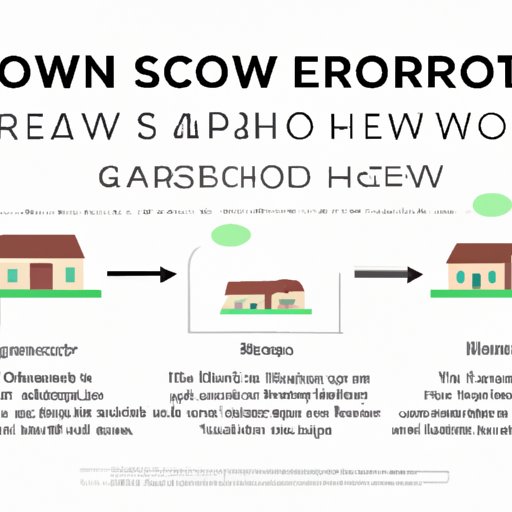Introduction
The term “escrow” can be a bit confusing and intimidating for many homebuyers. It is important to understand what an escrow period is and what to expect when you’re in one. This article will provide an overview of the escrow process and offer helpful tips for homebuyers on how to navigate their way through it.

Exploring the Process of Being in Escrow: A Guide for Homebuyers
An escrow account is a third-party holding account that holds money and documents until all conditions of a real estate contract have been met. The escrow agent acts as a neutral party in the transaction and ensures that all funds and paperwork are handled correctly. The escrow process begins when a buyer and seller sign a purchase agreement, and ends when the title of the property is transferred to the buyer.
What happens during the escrow period? Generally, the escrow agent will collect all the necessary documents and funds from both the buyer and seller. They will also ensure that all conditions of the purchase agreement are met. During this time, the escrow agent will also conduct a title search to make sure there are no liens or other claims against the property. Once all conditions have been met, the escrow agent will release the funds and documents to the appropriate parties and record the transfer of title to the buyer.
The following are some of the common steps involved in the escrow process:
- Verifying the buyer’s ability to purchase the property
- Reviewing the purchase agreement
- Collecting the necessary documents and funds from both the buyer and seller
- Conducting a title search to make sure there are no liens or other claims against the property
- Transferring the title to the buyer
- Closing the escrow account
What to Expect When You’re in Escrow: An Overview
When you’re in escrow, there are certain financial considerations you should take into account. For example, you may need to pay a down payment and closing costs. You should also be aware of any timelines and deadlines associated with the escrow process. It is important to stay organized and meet any deadlines in order to avoid potential delays.
In addition to financial considerations, there are potential risks associated with being in escrow. For instance, if the title search reveals a lien or other claim against the property, the escrow may be delayed or even cancelled. In addition, if the buyer does not have enough funds to cover the purchase price, the escrow could be cancelled.
How to Prepare for a Successful Escrow Period
In order to prepare for a successful escrow period, there are several steps you should take. First, gather all the necessary documents such as proof of income, bank statements, and tax returns. You should also research your lender to make sure they are reputable and reliable. Additionally, you should review all closing costs and fees associated with the purchase. Finally, it is always a good idea to seek professional advice from a real estate attorney or financial advisor.
The Benefits of Being in Escrow: Why You Shouldn’t Stress
Although the escrow process can seem daunting, there are many benefits to being in escrow. For one, it offers peace of mind knowing that a neutral third party is handling all the paperwork and funds. Furthermore, the escrow process eliminates much of the paperwork and hassle associated with buying a home. Finally, the escrow process helps to streamline the buying process and reduce the risk of delays.
Navigating Your Way Through Escrow: A Step-by-Step Guide
The following is a step-by-step guide to help you navigate your way through the escrow process:
- Step 1: Understand what will happen during the escrow process. Make sure you understand all the terms and conditions of the purchase agreement.
- Step 2: Complete all necessary paperwork. This includes signing all documents and submitting them to the escrow agent.
- Step 3: Read through all documents before signing. Make sure you understand everything and ask questions if you don’t.
- Step 4: Make sure all funds are in order. This includes down payments, closing costs, and other associated fees.
- Step 5: Stay organized. Keep all documents and paperwork in one place and make sure everything is up-to-date.

Understanding the Escrow Process: Tips for Homeowners
The escrow process can be overwhelming, but there are ways to make it easier. Talk to your realtor and ask any questions you may have. Be proactive in gathering all the necessary documents. Ask your lender about closing costs and other fees. Finally, don’t forget to check out the neighborhood and make sure it is the right fit for you.
Conclusion
The escrow process can seem intimidating at first, but with the right preparation and understanding, it can be a relatively straightforward process. Make sure you understand what an escrow account is, what happens during the escrow period, financial considerations, timelines and deadlines, potential risks, how to prepare for a successful escrow period, the benefits of being in escrow, and tips for navigating your way through it. With the right preparation, you can make the escrow process a smooth and stress-free experience.
(Note: Is this article not meeting your expectations? Do you have knowledge or insights to share? Unlock new opportunities and expand your reach by joining our authors team. Click Registration to join us and share your expertise with our readers.)
